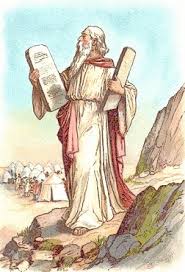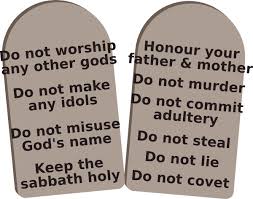Zechariah 5:1 – Again I lifted my eyes and saw, and behold a flying scroll!

The sixth vision of Zechariah is very short – only four somewhat cryptic verses. However, those four verses contain a lot of wisdom and knowledge. It is up to us to dig up and sift this portion of scripture like a miner searching for gold. When we do, we will be rewarded with spiritual wealth!
Let's start with this question: What did the first five visions of Zechariah have in common? How were they alike?
Answer: They were all messages of comfort, victory, prosperity, forgiveness and peace. In each of the first five visions, God was revealing how much he loved his people. He gave them glimpses of all the wonderful, astonishing, miraculous things he had in store for them.
But God is not all sugar and spice and everything nice. He requires obedience to his commands. Since the Jews were entrenched in sin, disobedience, and unbelief, God needed to correct their course.
As we study the last three visions, we find that the tone, character and message of the visions change. The last three still present promises of hope and victory, but they also involve elements of judgment.
As we will see, judgment precedes Israel's restoration and is very prominently connected with it.
We should not be surprised by this. As we have noted many, many times in this blog, God is faithful to his promises. When he promises to do good for his people, he keeps his promise. When he promises to correct his people for their sin or bring judgment on those who rebel, he keeps those promises as well.
The purpose of these actions is not to destroy God's people; it is to correct their course and bring them back into a right relationship with him.
With that in mind, let's dig into this vision.
Zechariah 5:2 – And he said to me, "What do you see?" I answered, "I see a flying scroll. Its length is twenty cubits, and its width ten cubits."
Zechariah 5:3 – Then he said to me, "This is the curse that goes out over the face of the whole land. For everyone who steals shall be cleaned out according to what is on one side, and everyone who swears falsely shall be cleaned out according to what is on the other side.
A flying scroll - At some point after Zechariah's vision of the lamp stand, he again 'lifts up his eyes' meaning that he is presented with a sixth vision. This time, he sees a scroll.

A scroll is simply a book which was written on parchment or papyrus (or possibly even an animal skin) and rolled up in the form of a cylinder. They are sometimes referred to as volumes or rolls. This was the usual form for books before modern day book binding was developed.
We know that the scroll in the vision is unrolled or unwound to its full extent.
This is obvious because otherwise the prophet could not determine its measurements. Zechariah describes the scroll as being 20 cubits long and 10 cubits wide. Since a cubit is approximately 18 inches, the scroll is 30 feet long and 15 feet wide.
There is another reason to assume the scroll is unwound – you can see that it has writing on both the front and the back.
But before Zechariah can read the scroll the assisting angel reveals its contents:
This is the curse– The assisting angel tells Zechariah that the scroll contains a curse, which is a judgment or a solemn declaration of chastisement against sin and disobedience (Deuteronomy 27:26, Jeremiah 11:3-4, Galatians 3:10).
Interestingly, this is not the only 'scroll of judgment' that we find in scripture.
The scroll in Zechariah's vision is remarkably similar to the scroll which was shown to the prophet Ezekiel. It too had writing on both sides and contained a promise/warning of judgment for the exiled Jews:
Ezekiel 2:9-10 - And when I looked, behold, a hand was sent unto me; and, lo, a scroll of a book was in it; and he spread it before me; and it was written inside and outside: and there was written in it lamentations, and mourning, and woe.
The apostle John also speaks of yet another scroll of judgment in the book of Revelation:
Revelation 10:10 -And I took the little scroll out of the angel's hand, and ate it up; and it was in my mouth sweet as honey: and as soon as I had eaten it, my stomach was bitter.
In the case of John's vision, the judgment is still in the future. It will be poured out upon all those who are in rebellion to the known commands of God. We will discuss this later in the post.
As for the Jews of Zechariah's day, the promise of judgment was not something new that God just randomly instituted on a whim. Back when God first entered into a covenant with the Jews, he clearly outlined the blessings that they could expect for obedience and the judgments they could expect for disobedience.
In other words, the judgments in Zechariah's vision were not some kind of 'fine print' in the covenant. They were well known to all.
The vision itself confirms that God has done nothing secretive. The curses/judgments were written and exposed on the enormous unrolled scroll as it flew through the air, indicating that its text was neither hidden nor concealed; the message had been published far and wide.
Now that we know the scroll is displaying a copy of the judgments that were promised to Israel for disobedience or unfaithfulness, where might we find the original text?
These curses/judgments can be found in Deuteronomy 27:15-26 and Deuteronomy 28:15-68.
Just to be clear, no Jew could claim they were ignorant of these judgments. The law was read in their hearing on a yearly basis. For example, Joshua read the promises of blessing and cursing to the entire nation once Israel had established itself in the Promised Land:
Joshua 8:34-35 - And afterward he [Joshua] read all the words of the law, the blessings and cursings, according to all that is written in the book of the law. There was not a word of all that Moses commanded, which Joshua read not before all the congregation of Israel, with the women, and the little ones, and the strangers that were living among them.
Here is a fun fact: Once Solomon's temple was built, the reading of the law normally occurred on the porch of the temple which, curiously, also measured 30 x 15 feet!
Is there any significance to the fact that the scroll in the vision was flying?

According to most bible commentators, the fact that the scroll was flying indicates that the promised judgments were swiftly approaching. The time for escape or repeal had passed; God was going to keep his promises of judgment. Through chastisement, he would bring Israel back into alignment with her destiny.
the curse that goes out over the face of the whole land – What does the angel mean when he says these curses or judgments will cover the whole land?
This refers to the whole land of Judea, or more accurately, the whole of God's people living in Judea. The Jews were the only people in covenant with God at that time, so they were the only people who were eligible to receive the promises of blessing or judgment.
As you know, this was not the only generation of God's people subject to judgment. In the days of the Messiah, curses/judgments came upon the Jews of Jerusalem for rejecting Jesus as the Messiah. In 70 AD, they witnessed the destruction of their nation, city and temple. They were disbursed throughout the world, where they remained until they became a nation once again in 1948.
And even though we now live in the age of grace, we would do well to remember that God does not change – Christians are still required to be obedient to God's laws and to avoid sin. If we do not, we too can expect judgment/discipline which will bring us back into alignment with God's laws and plans.
Hebrews 12:6 - For whom the Lord loves he chastens, and scourges every son whom he receives.
For everyone who steals shall be cleaned out according to what is on one side, and everyone who swears falsely shall be cleaned out according to what is on the other side - Notice that the writing on one side of the scroll deals specifically with stealing, while the writing on the other side specifically mentions swearing falsely. Why is that?
Before we explain, we need to be clear about the meaning of 'swears falsely'. It does not refer to a common lie spoken to another person. It refers to swearing a false oath or committing perjury.
 Perjury is the willful swearing of an oath in order to affirm something that is false or untrue. It is a legal term. In our society, we use it within the court system. If you are called to the witness stand to give testimony, you must give an oath that you are telling the truth (the truth, the whole truth and nothing but the truth). If you are subsequently found to be lying, you have committed perjury which is punishable under the law.
Perjury is the willful swearing of an oath in order to affirm something that is false or untrue. It is a legal term. In our society, we use it within the court system. If you are called to the witness stand to give testimony, you must give an oath that you are telling the truth (the truth, the whole truth and nothing but the truth). If you are subsequently found to be lying, you have committed perjury which is punishable under the law.Perjury/swearing falsely involves anything that would impair the impartial and effective administration of justice. It is emphatically condemned in our society and in Jewish law.
Although perjury is a crime against mankind, in a broader sense it is also a crime against God. It is an example of treating him with irreverence by denying his omniscience, scorning his laws, profaning his name, and violating truth. God considered perjury a heinous crime:
Leviticus 19:12 - And you shall not swear by my name falsely, neither shall you profane the name of your God: I am the LORD.
Zechariah 8:17 - And let none of you imagine evil in your hearts against his neighbor; and love no false oath: for all these are things that I hate, says the LORD.
With this in mind, let's circle back to the significance of stealing and perjury/swearing a false oath.

This reference goes back to the 'ten words' or what we commonly call the Ten Commandments (which are also referred to as Decalogue). As you recall, God gave the Ten Commandments to Moses while he was up on Mount Sinai for 40 days and nights.
Scripture is very clear that, like the scroll, the stone tablets had writing on both sides:
Exodus 32:15-19 - And Moses turned, and went down from the mount, and the two tables of the testimony were in his hand: the tables were written on both their sides; on the one side and on the other were they written. And the tables were the work of God, and the writing was the writing of God, engraved upon the tables.
When Moses descended with the stone tablets, he found that Aaron had made a golden calf which Israel was worshiping at that very moment! In a fit of righteous rage, Moses threw the stone tablets and broke them (for the full story, see Exodus 32).
Later, God instructed Moses to form two new tablets and bring them up the mountain. God then inscribed the commands on the two tablets which Moses provided as replacements (Exodus 34:1).
Since there are 10 commands and two tablets, it is natural for us to assume that there were five on each tablet, but that is not necessarily the case. In fact, many scholars believe there were four commands on the first tablet, and six on the second.
If this is the correct grouping, then it has the clear advantage of proclaiming all of our duties to God on the first tablet:
- You shall have no other gods before me.
- You shall not make or worship any graven images/idols.
- You shall not take the name of the Lord in vain. (This is the command that refers to perjury or swearing false oaths.)
- Remember the Sabbath day to keep it holy.
While all of our duties to our fellow man are on the second tablet:
- Honor your father and mother.
- You shall not kill.
- You shall not commit adultery.
- You shall not steal.
- You shall not bear false witness.
- You shall not covet.
(See Exodus 20:1-17 and Deuteronomy 5:1-22).

So by referencing the command 'You shall not swear falsely' (or take the name of the Lord in vain), the angel invokes all of the commands of the first tablet. By referencing the command 'You shall not steal' the angel is invoking all of the commands of the second tablet. Thus, all ten words or commands are being referenced by the writing on the scroll.
Although God singles the Jews out for the specific sins of stealing and falsely swearing, the vision indicates that judgment is coming because the Jews have disregarded the whole law (all ten commands). They corrupted the worship of God, while defrauding and oppressing their fellow man. All would be punished because none were guiltless.
Now, before we move on to the final verse, let's re-examine the nuggets of information that we discovered about the scroll:
- The scroll is fully open and measures 30 x 15 feet. These are the exact dimensions of the temple porch where the law was read to the Jewish people on a regular basis. The scroll is open to show that the warnings it contained had been openly and publicly proclaimed to all the Israelites; no one could claim ignorance as an excuse.
- The judgment was written down which indicates that the time for repeal or escape had passed; the decree for judgment had been issued.
- The scroll was flying, to show that judgment would come swiftly/immediately.
- The writing was on both sides of the scroll to connect it with the tablets of the Law and to show its comprehensive nature. One side denounced perjury, representing the entire first table of the law. The second side denounced stealing, representing the entire second table. Thus, Israel is accused of breaking all ten commands.

The immediate application of the vision was to the Jews in Zechariah's day who had abandoned the construction of God's house in order to build their own homes and fill their own bank accounts. They were robbing God and profaning the oath they made to return to Jerusalem for the express purpose of rebuilding the temple/walls.
This may have been why 'stealing' and 'falsely swearing' were the specific commands mentioned in the vision.
Zechariah 5:4 – I will send it out, declares the Lord of hosts, and it shall enter the house of the thief, and the house of him who swears falsely by my name. And it shall remain in his house and consume it, both timber and stones.
I will send it out/it shall enter the house – The judgment that was coming was sent by God and it would not miss its mark. It would find its way into the home of each and every offender who had profaned God's law – no exceptions.

It shall remain in his house and consume it, both timber and stones – Once the judgment arrived, it would not leave until it thoroughly consumed everything in the household to which it was sent. It was like a disease – infecting, wasting, consuming, and destroying until everything in the house was gone, down to the very foundations of the structure.
Thus, the people who abandoned their commitment to God in order to build up their own prosperity were in trouble. Their efforts to enrich themselves were in vain, because everything they worked for was consumed by God's wrath. By the time this vision was given, the judgment was already under way. The setbacks, hardships and lack the Jews were experiencing were the result of the judgment of God.
But there was still hope for God's people. The purpose of judgment was to prompt the Jews to repent and correct the error of their ways. As they removed sin and deception from their relationship with God and each other, God would restore their fortunes. And as we will see in the next vision, God would eventually put an end to their suffering and trouble after he had removed their iniquity.
So, as we noted at the beginning of this study, judgment precedes Israel's restoration and is very prominently connected with it.

Now that we have a better understanding of the vision, ask yourself this question: Does this vision have an application during the age of grace, or did it only apply to those under the law?
I believe it still applies today, because God has not changed. He still loves to bless his children, but he will still discipline those who persevere in sin without repentance.
During the time of Christ, there were some Christians who felt that it was okay to sin, since the grace of God would atone for it. In fact, they thought it was okay to sin even more, because it would magnify the glory of God when he forgave them. However, the apostle Paul refutes that claim:
Romans 6:1-2, 6 - What shall we say then? Shall we continue in sin, that grace may abound? God forbid. How shall we, that are dead to sin, live any longer in it? Knowing this, that our old man is crucified with him [Christ], that the body of sin might be destroyed, that we should no longer serve sin.
It is obvious that even though we live in an age of forgiveness and grace, we are still responsible for keeping God's commands. We are instructed to be holy, just as God is holy:
1 Peter 1:15-16 - But as he who has called you is holy, so be holy in all manner of conduct; because it is written, You will be holy; for I am holy.
Just like the Jews, we are to live our lives in such a way as to reflect the glory of God and light the way for sinners to repent.
If we choose to live worldly lives, we can expect God to chastise us, in order to set us back on the right path. Scripture tells us that judgment begins in the house of God (I Peter 4:17).
Let me offer you some encouragement:
Some Christians are in the habit of practicing 'sloppy grace'. They are not overly concerned with living holy lives, because the grace of God is able to forgive all sin. If this is your point of view, I encourage you to take a second look at the teachings of the New Testament.
If you do, you will find that God takes your personal holiness seriously. We are to be a nation of kings and priests; we are to walk in a manner worthy of the name of the Lord (Ephesians 4:1, Colossians 1:10, I Thessalonians 2:12, etc).
If you persist in engaging in sin without repentance, God will not hesitate to correct you, just as an earthy father corrects his children for their own good. So do yourself a favor – take stock of your personal holiness and make changes if needed.
Let me offer you some relief:
The world loves to present an untrue picture of God. It tries to paint him as an angry tyrant, who is up in heaven waiting for you to fail so he can punish you.
If this is your impression of God, let me give you some relief.
God is a loving Father who wants to bless you with things so wonderful, you can't even imagine them (I Corinthians 2:9).
Think about it this way: God has already given you the most precious gift in the universe – his Son, Jesus. Why would he do that if he was looking for an opportunity to punish you? Plus, if God was willing to give you his best, why would he withhold any lesser gift from you?
Romans 8:32 – He [God] who did not spare his own Son but gave him up for us all, how will he not also with him graciously give us all things?
The truth is that God never derives pleasure from punishing people. He lovingly but firmly corrects his children for their own good, just as he did with the Israelites.
Let me offer you some strength:
Perhaps you find yourself in a season of correction right now. If that is the case, don't despair. Humble yourself, repent, submit to authority, and make whatever amends are necessary. Make sure you understand the circumstances that took you off course, so you can avoid making that mistake again.
Finally, strengthen yourself with the knowledge that this is a temporary season - God takes great delight in having you 'back on course' and his blessings will find you as you walk according to his plans and purposes for your life!
